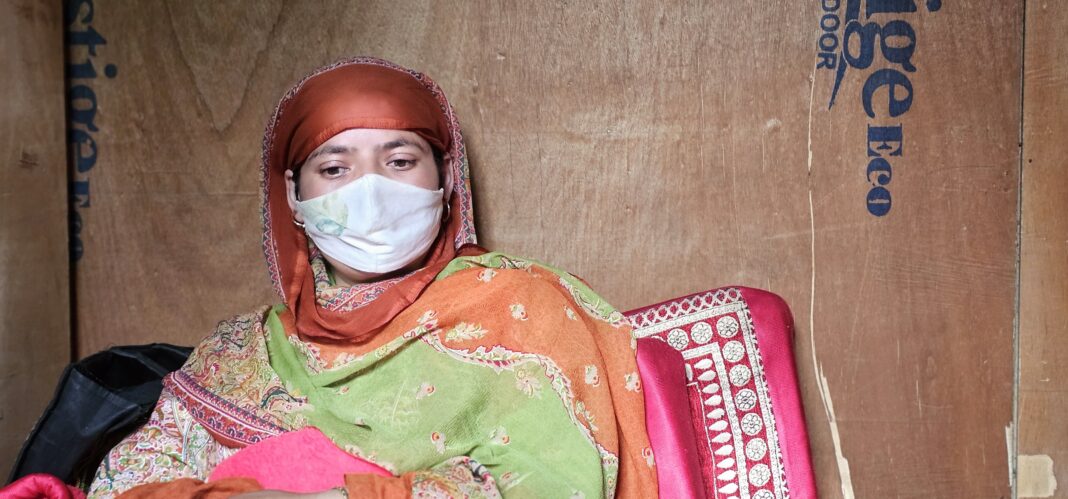‘A Border, a Bedside, and a Broken Promise’
In a quiet Gundpora north Kashmir’s Bandipora village, a woman waits for death—not because her illness has triumphed, but because her country has turned away. Inside a makeshift home with peeling paint and borrowed prayers, 42-year-old Zahida Najar is dying of cancer. She is terminal, impoverished, and out of options. But it’s not the disease alone that is killing her—it’s the decision of a government that now seeks to deport her, labeling her a foreigner after fifteen years of residence, motherhood, and quiet obedience.
Once a hopeful returnee under Ministry of Home Affairs, Government of India’s ambitious 2010 Rehabilitation Policy, Zahida now lives like a fugitive in the land that promised her peace. Her story is a devastating reflection of how political will, when abandoned, metastasizes into human tragedy.
Neighbours say that Zahida’s story began with a promise—a promise that she, like hundreds of others, believed was her chance at dignity. In 2010, the Indian government unveiled a policy aimed at reconciling with its past: ex-militants who had crossed over to Pakistan-administered Kashmir were invited to return, surrender arms, and rebuild lives. The initiative was framed as a courageous peace offering—part amnesty, part reintegration.
Zahida crossed over with her husband, Bashir Ahmad Najar, a former militant, and their toddler daughter. They arrived not with weapons, but with worn-out documents and weary hope. For over a decade, they lived like any ordinary family: renting homes, sending their children to school, voting in local elections, queuing for rations, even collecting benefits under the Ayushman Bharat scheme. They were not only visible—they were part of the system.
But time, and governments, changed. The Rehabilitation Policy was quietly shelved, its promises dissolved without formal revocation. Zahida’s paperwork, once sufficient to mark her presence, is now weaponized to justify her absence. Her voter ID, Aadhaar, and domicile certificate are deemed irrelevant by the state that issued them.
A Deportation Order, a Death Sentence
Last month, Zahida received a letter that would shatter her world. She is to be deported—along with her two daughters, 15 and 14—to Pakistan. Her husband and son are allowed to remain. In other words, her family is being surgically split along lines drawn not by guilt or crime, but by bureaucratic whim.
“I will not go,” Zahida whispers from her bed, her frame frail but her eyes defiantly alive. “I would rather die here than leave my children behind.”
“Her defiance is not dramatic—it is maternal. What government asks a mother to abandon her children on the eve of death? What law condemns a woman, who for years has lived publicly and peacefully, to exile because the same government forgot its own oath,” asks Muhammad Subhan, a neighbor.
In Bandipora, Zahida is not a foreigner. Her neighbors call her “Shahzada”—princess—not out of irony, but respect. She is remembered not for her origins, but for the way she lived: humbly, helpfully, and with grace. She served food at weddings, sat with the sick, and never raised her voice in a village that knew her well.
“She’s one of us,” says Ashiq Hussain, a neighbor. “The government should have some mercy. She is not a terrorist. She is a dying mother.”
Her children cry themselves to sleep. Her husband, once a man trying to bury his past, now struggles to protect the only future he has—his family.
“I trusted India,” Bashir says, “and that trust is now killing my wife.”
What happened to the 2010 Rehabilitation Policy is emblematic of a deeper rot. Born in a moment of political courage, it died in bureaucratic neglect. No formal repeal, no structured review—just silence. Today, that silence echoes through the homes of hundreds like Zahida, whose lives are being quietly unraveled.
Lawmakers claim the policy was never legally binding. Officials suggest the deportations are about national security. But where, in Zahida’s worn body and tear-streaked children, is the threat? Is the threat in her cancer-ravaged lungs, or in the memory she carries of once believing in peace?
Zahida’s fight is no longer about legal status. It is about dying with dignity. It is about a mother who wants to hold her daughters’ hands as her breath fades, not from across an uncrossable border.
“I don’t want to be buried where no one will cry for me,” she says.
Her wish is heartbreakingly modest: to stay, to die, to be remembered not as a deportee, but as a woman who believed.
At the heart of Zahida’s story lies a question far bigger than her case: What kind of country turns away a dying mother it once welcomed? What kind of nationalism demands exile in place of empathy?
This is not a matter of border policy—it is a matter of character. And Zahida’s story is a mirror. In it, we see not just the suffering of one woman, but the fading soul of a promise made and broken.
And as Zahida asks one final question, it rings louder than any political slogan:
“Is the price of peace always paid by those who believed in it the most,” she asks.





